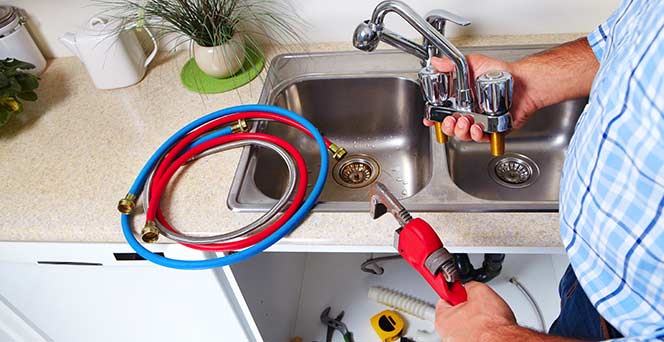Looking after your kitchen plumbing is super important if you want to dodge random problems and keep things running smoothly.
If you ignore it, you might end up with leaks and clogs that mess up your day and cost a lot to fix. It’s like not fixing a tiny crack that could turn into a big issue later. By checking things regularly, you can save yourself stress, time, and money in the long run.
A quick look can catch small problems before they turn into big ones, helping your kitchen gadgets work better and last longer. Keeping on top of these checks is a smart move for your kitchen’s future.
The Importance of Regular Inspections for Kitchen Plumbing Appliances
Checking out your kitchen’s plumbing regularly is a smart move to keep everything running smoothly. Make it a habit to look for leaks, rust, or wear and tear.
Peek under the sink, around the dishwasher, and other spots that use water. Catching small problems early can stop them from becoming big, pricey ones.
When you’re looking around, jot down what you find. Writing it in a notebook or using an app makes it easy to keep track and spot any patterns.
Plus, when your appliances are well cared for, they work better, making cooking and cleaning a breeze. If you don’t fancy doing these checks yourself, think about hiring a pro to do it once a year.
Starting a regular inspection routine can save you a lot on repairs and help your kitchen gear last longer. Why not give it a go this weekend? It’ll keep your kitchen working great for years to come.
Cleaning the Dishwasher Filter
Keeping your dishwasher filter clean is a bit like giving your trusty kitchen helper a spa day. It might not be the most glamorous task, but it’s essential to prevent those pesky clogs and keep your dishwasher running like a dream.
Imagine leaving food bits to build up—it’s like sticking a potato in your car’s exhaust pipe! Not great for performance, right? So, let’s aim to clean that filter about once a month. Here’s how you can tackle it:
First things first, make sure your dishwasher is off. Safety first! Then, slide out the bottom rack to get access to the filter. It’s usually sitting there at the bottom, a small round piece just waiting for attention.
To remove it, twist the filter to the left and carefully lift it out. It might feel a bit like opening a jar of stubborn jam, but keep at it. Once it’s out, rinse it under warm water.
Grab a soft brush—an old toothbrush works wonders—and gently scrub away any stubborn bits of food. It’s like brushing your teeth, just for your dishwasher.
After it’s all sparkling clean, pop the filter back in its spot and twist it to the right until it feels snug and secure. Think of it like screwing a cap back on a bottle—make sure it’s tight so nothing leaks out.
By giving your dishwasher this little TLC every month, you’re helping it last longer and work better. A clean filter ensures a good water flow, keeping everything running smoothly and saving you from those annoying repair bills.
So, why not set a reminder for this easy maintenance task? Your dishwasher will thank you with years of faithful service. Happy cleaning!
Checking and Replacing Hoses
Making sure your kitchen hoses are in good shape is key to stopping leaks and keeping things running smoothly. Every six months, it’d be a good idea to check all the hoses hooked up to your kitchen gadgets.
Keep an eye out for cracks, bulges, or any signs of damage—they can be trouble. If you spot anything wrong, swap the hose out right away. Go for strong, high-quality hoses that last longer and work better.
This simple check can save you from annoying leaks and expensive repairs. Replacing old hoses is smart and saves money, keeping your kitchen running smoothly. By checking up on your hoses regularly, you’re making sure your kitchen stays efficient and hassle-free.
Descaling Kitchen Appliances for Efficiency
Mineral buildup’s a common problem that can mess up kitchen gadgets like dishwashers and kettles. Hard water leaves deposits over time, which can clog these appliances and make them use more energy. To keep them working well, descaling is a must.
For kettles, just mix white vinegar and water in equal amounts, fill the kettle halfway with this mix, and let it sit for around an hour. Then, boil it and rinse the kettle with cold water. This easy trick clears out the limescale, so the kettle works great again.
Dishwashers can use store-bought descaling products. Pour the descaler into the bottom, run an empty cycle on the hottest setting, and boom—bye-bye mineral deposits. Doing this every few months keeps the dishwasher going strong.
Regular descaling saves energy and cuts down on electricity bills. It’s a simple habit that makes a big difference, helping your kitchen appliances last longer. Keeping them free from mineral buildup is a smart way to save on household costs.
Proper Disposal Practices
To keep your kitchen plumbing in tip-top shape, start by chucking waste the right way. Loads of folks mistakenly dump grease, coffee grounds, or stringy food bits like celery and potato peels down the sink. This can cause major clogs.
Instead, try tossing these in a compost bin or the rubbish bin. It’s a simple change that can save you from forking out loads for plumbing repairs.
Keeping your pipes clear means fewer problems and everything at home runs smoothly. Even though it seems small, this tweak can really help your household run better.
Recommending Water Softeners for Hard Water Problems
Having trouble with hard water? You’re not alone. It often causes minerals to clog up pipes and mess with your kitchen gadgets, making them work less efficiently and costing you more on energy bills. But a water softener could really help keep your kitchen running smoothly.
Benefits of Using a Water Softener
- Enhanced performance. Water softeners cut down on those pesky mineral deposits, helping your appliances run better, use less energy, and last longer.
- Cost savings. When your appliances are working well, they break down less and don’t need replacing as often. This can save you quite a bit of money over time.
Thinking about getting a water softener? It might be a good idea to chat with a pro to find the best one for your home. A water softener not only helps your kitchen gear last longer, but it’s also a smart way to save money, making it a great addition to any home.
Conclusion
Keeping your kitchen in good shape is key to saving time and cash, plus it helps your appliances last longer. Regularly check things like your dishwasher filters, hoses, and get rid of any scale build-up.
These simple tips can stop you from having to pay for big repairs later. Also, think about getting rid of waste properly and maybe adding a water softener to keep your pipes in good nick. When you do all this, your kitchen will run like a dream.
Don’t wait for problems to pop up. Start these habits now and enjoy a kitchen that works smoothly without any fuss. It’s a great way to keep your appliances and wallet safe for the long haul!





